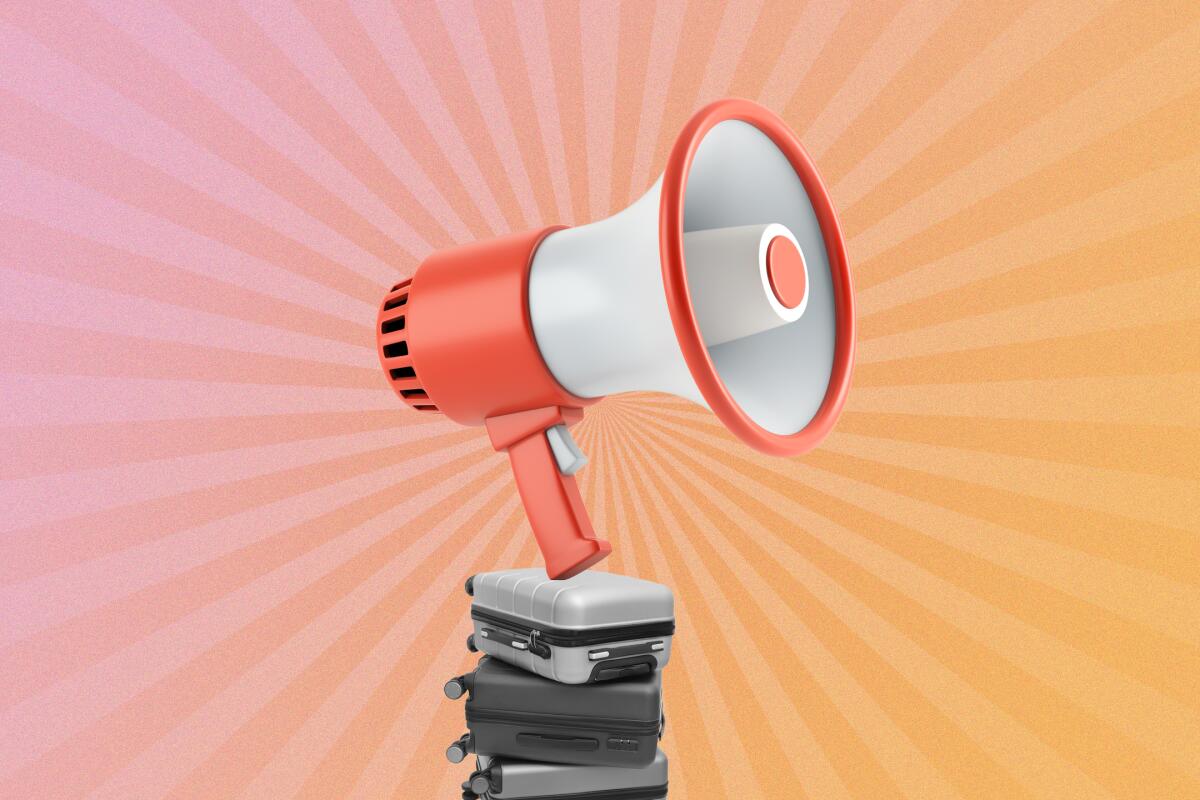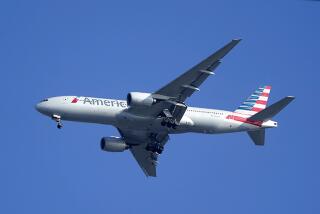All I want for Christmas is for the DOT to put fliers’ safety first

- Share via
This email popped into my mailbox recently: “I love you, Catharine Hamm!” My response: I put my head down on my desk and cried.
Not because I was touched by the sentiment, although I was, but because I was so angry that it had come to this.
Travelers, you’re in a world of hurt these days.
You’re desperate because you’ve been jerked around and don’t know where to turn, especially when it concerns the airlines. When the sky is falling, who will help the little red hen?
Sometimes I do, but usually I write about what new ridiculousness is afflicting the traveling public. The real superheroes are those who advocate for consumers by fighting through the red tape, especially this year. Among those who stand up for consumers: Christopher Elliott, whose nonprofit, Elliott.org, offers free advice and help; William McGee, aviation advisor for Consumer Reports, whose Travel Letter he used to edit; and Kurt Ebenhoch, executive director of Travel Fairness Now.
We share many frustrations, an overwhelming number of those tied to a pandemic that has stood travelers on their heads. And when they encounter a problem with, say, an airline refund, where do they turn?
Definitely not to the airlines, which in the early months of the pandemic took obfuscation to a higher level. Many offered vouchers instead of refunds because they needed the cash to stay afloat during the economic tsunami.
Sometimes to their credit card companies, which will be your advocate if you lodge your complaint within a 60-day period of purchase or billing cycle.
And generally, not to the Department of Transportation, which wasn’t staffed for the avalanche of complaints, although it has moved personnel to try to keep up with a caseload that has often been larger in one month than it was in all of 2019.
Couple that with what some advocates who work closely with the department say is a less-than-stellar job of protecting fliers and you have a recipe for outrage overload.
Especially when you realize what an economic powerhouse travel is: $1.1 trillion spent by this country’s domestic and inbound travelers in 2019, the U.S. Travel Assn. calculates, and nearly $9 trillion contributed to the world’s gross domestic product, according to the World Travel & Tourism Council. That’s about 10% of global gross domestic product.
As we look ahead to changes in leadership, here are issues — your issues — that must be addressed if we are to ensure fliers’ financial and physical safety is protected:
Airline refunds
The rule for giving travelers refunds is clear: If the airline canceled the flight and you want your money back, you should get your money back.
But this year it hasn’t worked that way.
“My nonprofit has gotten tens of thousands of complaints about airline refunds — so many we can’t handle them all,” Elliott said.
The pandemic “is a once-a-century catastrophe that the system was never designed to handle,” said Elliott. “What the experience has taught us: There needs to be a better system.”
Here’s one easy step: You can file a complaint with the DOT if you haven’t received a refund to which you are entitled.
What’s harder to understand: The DOT has issued two enforcement actions this year that apply to airlines doing business in the U.S., telling them to comply. Yet many of those carriers pocketed your money to keep themselves afloat, then pretended not to notice that Atlas had spoken.
U.S. carriers got a double win: your money and your taxpayer dollars with government bailouts, Elliott said, adding, “U.S. airlines were trying to have their cake and eat it too.”
U.S. carriers have begun to comply, but the most recent Bureau of Transportation Statistics figures show that complaints about foreign carrier refunds (4,016) far outpaced those of domestic carriers (1.718). TAP Portugal led the foreign pack, followed by Air Canada and El Al.
Solution: The DOT could just, oh, I don’t know, enforce its rules. Although your congressional representatives won’t intervene in individual cases, you can share your thoughts about enforcing existing regulations that say you are due a refund.
Masks
Attention, flying public. If you think masks infringe on your freedom, please know it’s your right to be unmasked — but not on an airplane that has rules that say you must.
At the beginning of COVID-19, when we thought the pandemic would be over in a couple of months, we asked the Federal Aviation Administration why it didn’t mandate masks. It said it was not a health agency and didn’t think this was its job. The Centers for Disease Control and Prevention has “strongly” recommended masks on public transportation, including planes, but it’s not its job to regulate airlines.
Whose job is it, anyway?
Your airline’s flight crew.
Because there is no federal regulation about masks, flight attendants often are in the position of saying, “Pretty, pretty please put on a mask,” said McGee, the aviation advisor. The results sometimes haven’t been pretty. (At last count, Delta had banned more than 500 fliers for life because they would not comply with the airline’s mask rule.)
“We applaud the airlines that are trying to [enforce mask rules], but it should not be up to them,” McGee said.
Part of the issue too is consistency from carrier to carrier, he said, which is to say mask rules aren’t uniform. Because much of the flying public travels infrequently and doesn’t don’t live and breathe regulations, how can we ask them to know which airline does and which doesn’t require masks, McGee asked.
Solution: Make mask wearing subject to federal regulation, just like seatbelts and smoking or standing in the aisle at takeoff or landing. If you disagree, drive.
Families sit together
Families can sit together, in many cases, if they’re willing to fork over the money to ensure they get a seat next to their child. Have you ever noticed how all the good seats now come with a price? The ones that don’t usually are middle seats.
I do not want to sit next to your kid if you’re not sitting next to your kid. It’s not that I don’t like kids; I’m one myself so they’re my peeps. What I don’t want to be is seated next to your offspring if we have to evacuate the plane and you’re seated several rows back. I don’t want to be responsible for his or her life.
The more worrisome part: Seating children alone makes them vulnerable to sexual predators.
Congress was concerned too. “In 2016, as part of the Federal Aviation Administration Reauthorization Act, [it] directed the Department of Transportation to review airline family seating policies to help ensure that young children can sit with their families on airplanes at no extra cost,” Consumer Reports noted.
But, the publication noted, DOT was not going to ask “airlines to make any changes to their family seating policies.”
In the four years, “the problem was only getting worse,” Ebenhoch of Travel Fairness Now said. “Premium seating fees [are charged] for the front of the aircraft where seats have additional legroom,” he said. “Then it grew to windows and aisles … and it got to the point that … the only free seats for preassignment were centers.
“If you are taking your 4- and 6-year-old to Disney World, are you going to line up in four center seats or are you going to pay these fees? For some families ... it can add … to the cost of a ticket.” And in case of an emergency? “Families are going to want to reconcile with their kids,” which will further slow evacuation.
The DOT said it hadn’t received enough complaints to make family seating a priority and so there the issue has sat, to the dismay of Ebenhoch and others who want to put consumers first.
Solution: Don’t leave this for the desk agent or the flight attendant to sort out. An adult should be with his or her child. And even though travel isn’t back to where it was, it will be one day. Before that day comes, maybe the DOT can climb out of its Never, Ever Land frame of mind and do what’s right for the people it’s supposed to serve.
That would indeed be a much-welcomed Christmas miracle.
Have a travel problem, dilemma or question? Write to [email protected]. We regret we cannot answer every inquiry.
More to Read
Sign up for The Wild
We’ll help you find the best places to hike, bike and run, as well as the perfect silent spots for meditation and yoga.
You may occasionally receive promotional content from the Los Angeles Times.






